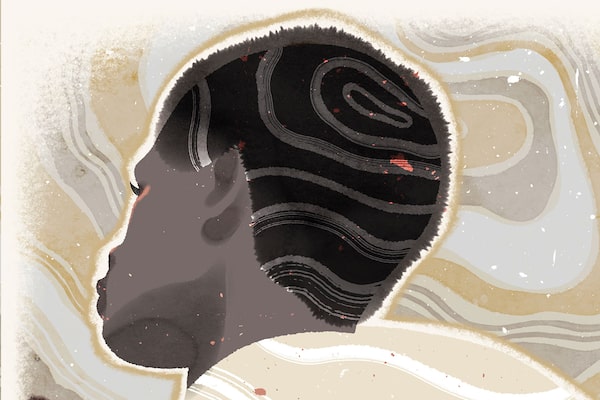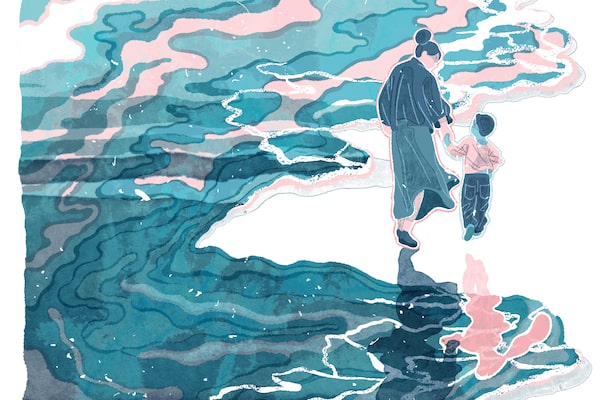This is the weekly Amplify newsletter. If you’re reading this on the web or someone forwarded this e-mail newsletter to you, you can sign up for Amplify and all Globe newsletters here.
Lara Pingue is the assistant national editor at The Globe and Mail.
It was a year ago in this same space that I lamented the loss of a care-free summer. We were five months into the pandemic back then, and though COVID-19 caseloads were taking a temporary dip, summer as we knew it was already over: Nobody was jetting off to exotic locales, fairs and concerts were cancelled, and the prospect of vaccines seemed but a distant dream.
Happily, 2021 is offering a few glimmers of hope (hello, two-dose summer), but my job as assistant national editor at The Globe is a constant reminder that new challenges await us at every turn.
Like so many of you, I look to the news to help me make sense of it all. In that spirit, here are five stories that resonated with me this week, from the Globe and beyond. Happy reading.
Zabeen Hirji, an executive advisor at Deloitte, says the next phase of hybrid working will be even more disruptive than it was when employees were forced to work from home in March, 2020.Tijana Martin/The Globe and Mail
Your boss secretly wants to quit
When The Globe published a story in March about white-collar workers burning out, we heard from hundreds of readers who shared the sentiment. Now, new research shows that executives and managers are on the verge of a breaking point. Writes The Globe’s Tim Kiladze, “The crushing pace and volume of white collar work during the pandemic, coupled with the intricacies of working from home, are pushing business leaders to the brink – and half are ready to leave their current jobs.” With more employers entering the tricky territory of moving their work force back to the office, workers are clamouring for a sense of control amid the uncertainty – even if that means quitting their jobs. But a silver lining is emerging amid the tumult. “I think this is the great reset opportunity to really redefine success,” said Zabeen Hirji, an executive advisor at Deloitte. “Success goes beyond the job, career, money. How much money do you really need to have a good quality of life?” Read the full story.

Remote work has offered many workers a taste of workplace flexibility, but women have reported higher rates of burnout.RyanJLane
For women, remote work is a blessing and a curse
Like a lot of working mothers lucky enough to work from home, I’ve been consumed by the prospect of returning to the office in the fall and what that means for work-life balance. But I’m troubled by why so many women are desperately clinging to working from home: It’s not because of convenience, it’s out of necessity. As Vox’s Rani Molla writes, “While the ability to work from home has been a godsend for working parents who were able to keep their children and jobs safe during the pandemic, it’s also exacerbated deeply ingrained gender inequality. Too often a crying toddler makes a cameo on a mother’s Zoom call and not a father’s. In a spare moment, women turn over the laundry while men don’t. Day-to-day scheduling, schooling, as well as decisions about their family’s health amid a global health crisis disproportionately fall to women … Women need more flexible work arrangements because women have more to do.” Read the full story.
Bird&Be founders Samantha Diamond, left, and Breanna Hughes, pose for a photo along with their prenatal supplement boxes at a pharmacy in Vaughan, Ontario, Saturday, July 10, 2021. (Galit Rodan/The Globe and Mail)Galit Rodan/The Globe and Mail
How struggles with fertility issues led two women to help others avoid similar challenges
“When life gives you lemons – start a company, raise $2.2-million, and fix the problem.” That’s the tweet that led me to the story of Breanna Hughes and Samantha Diamond, the founders of Bird&Be, an e-commerce company that helps women identify and address fertility concerns early on. Hughes and Diamond both dealt with their own fertility struggles and knew there was an untapped market of women who felt underserved or ignored. “After high school, there’s literally 15 to 20 years of radio silence on anything to do with proactive family planning. And then, suddenly, you find yourself in the fertility clinic, and you’re thinking, ‘Why didn’t anyone tell me this earlier?’” Hughes told The Globe’s Irene Galea. The pair are part of the growing “femtech” space, which targets the needs of women and girls; earlier this week, they raised $2.2-million to launch new products, expand production and grow their team of 11. And more good news: after five years and three rounds of IVF, Hughes is expecting her first child. Read the full story.

Illustration by Rachel WadaThe Globe and Mail
Can racism cause schizophrenia?
I was fascinated by Globe reporter Erin Anderssen’s deep dive into schizophrenia, which explores decades of research that found that racialized people are diagnosed with the disorder at far higher rates than the general population. She writes: “The explanation for this is still being debated. But many researchers have begun to circle one theory in particular – a hypothesis that has ramifications not only for how we diagnose and treat mental illnesses, but what is required to prevent them in the first place. Step back further, and this theory raises uncomfortable questions about the harm inflicted on those deemed by the majority to be outsiders.” What makes the story so compelling is where the solution may lie: not in a research lab or a powerful drug, but rather in individual and collective action. “Society is not trapped by genes or confined by history. This is a problem that society can solve.” Read the full story.

Illustration by Rachel Wada
I’m learning how to parent my transgender son
This essay by Rhiannon Jones is a compelling look at what a parent grapples with when a child comes out as transgender. “It is the ghost of grief. It is an intangible loss, one that has equal measures of sadness and joy. There is no word for this. Our lives are shaped by beginnings and endings, and most of those have a name, a definition. Death, marriage, birth. This has no name; its very name is fog: transition.” Told with honesty and candour, the piece explores a range of emotions before landing on a note of optimism. A beautiful read. Read the full story.
What else we’re thinking about:
Next to my premium cable package, my Toronto Public Library card has been my lifeline during the pandemic. I spent most of the winter reading Very Serious Fiction, and now that my local library is allowing in-person browsing again I can finally catch up with my other passion: reading back issues of gossip magazines. Oh, the simple pleasures of dissecting a celebrity’s diet or learning about what essential beauty items A-listers keep in their Birkin bags. Why yes, I really do want to know the salacious details of a breakup between two people with whom I have literally zero connection. Gossip – both the bland, low-stakes kind and the juicy stuff that sets the internet ablaze – can be good for us, a way for us to interpret and understand the world. I’m reminded of this 2018 Washington Post profile of Canada’s gossip guru, Elaine Lui, who staunchly defends her line of work. In introducing Lui, reporter Jessica M. Goldstein writes, “Gossip is a communication tool, a collective finger on the pulse of our culture, a means of sussing out our morals, our insecurities, our aspirations, our fears.” So yes, bring on the Us Weekly. I’m reading it in the name of cultural anthropology.
Inspired by something in this newsletter? If so, we hope you’ll amplify it by passing it on. And if there’s something we should know, or feedback you’d like to share, send us an e-mail at amplify@globeandmail.com.